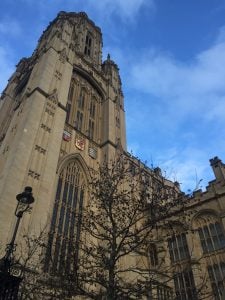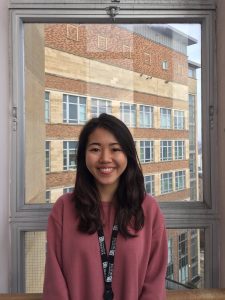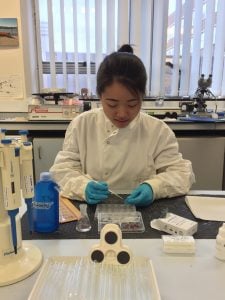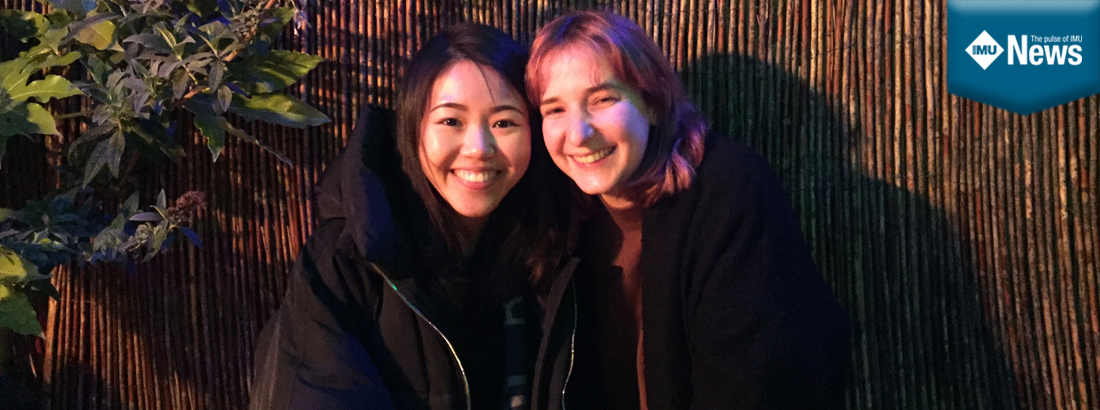December 2018 – As a final-year Biomedical Science student at the International Medical University (IMU), I had the opportunity to undergo a 3-month research internship at the University of Bristol in UK. Ever since I was in high school, I had always been interested in neuroscience, and wanted to study in the UK. Given this opportunity of an internship in UK, I saw my chance to fulfil my dream and I took it.  For my internship, I had the opportunity to undergo the internship with Prof Richard Apps and his team from the School of Physiology, Pharmacology and Neuroscience at the University of Bristol. During my internship, I worked with Prof Apps’ group, which is also known as the sensory motor systems group. The sensory motor systems group carries out a variety of fascinating studies to grant a wider neuroscience research theme group at the University of Bristol. The main research interest of the group is to look into the climbing fibre pathways linking the inferior olive and the cerebellum in controlling voluntary movements. The group also aims to study and analyse the neuronal sensory mechanisms on the detection and perception of noxious stimuli, for instance, excess heat, cold and pain. Furthermore, the detection and encoding of sound by the sensory cells and neurons of the inner ear is also being addressed. During my placement, I contributed to a project in investigating the neural dynamics of the survival circuits by looking into the connections between the cerebellum and the periaqueductal grey. This research project which started in 2017 aims to map the anatomical and functional connections between the periaqueductal grey and the cerebellum as well as to investigate the behavioural significance of the cerebellar-periaqueductal grey interactions. In this project, experiments were performed on rats. According to the UK Animals (Scientific Procedures) Act of 1986 and the University of Bristol Animal Welfare and Ethical Review Body, only an authorised licensee is allowed to conduct the animal testing and research. Hence, throughout my internship, I was only allowed to handle the rats and not perform experimental procedures on the animals.
For my internship, I had the opportunity to undergo the internship with Prof Richard Apps and his team from the School of Physiology, Pharmacology and Neuroscience at the University of Bristol. During my internship, I worked with Prof Apps’ group, which is also known as the sensory motor systems group. The sensory motor systems group carries out a variety of fascinating studies to grant a wider neuroscience research theme group at the University of Bristol. The main research interest of the group is to look into the climbing fibre pathways linking the inferior olive and the cerebellum in controlling voluntary movements. The group also aims to study and analyse the neuronal sensory mechanisms on the detection and perception of noxious stimuli, for instance, excess heat, cold and pain. Furthermore, the detection and encoding of sound by the sensory cells and neurons of the inner ear is also being addressed. During my placement, I contributed to a project in investigating the neural dynamics of the survival circuits by looking into the connections between the cerebellum and the periaqueductal grey. This research project which started in 2017 aims to map the anatomical and functional connections between the periaqueductal grey and the cerebellum as well as to investigate the behavioural significance of the cerebellar-periaqueductal grey interactions. In this project, experiments were performed on rats. According to the UK Animals (Scientific Procedures) Act of 1986 and the University of Bristol Animal Welfare and Ethical Review Body, only an authorised licensee is allowed to conduct the animal testing and research. Hence, throughout my internship, I was only allowed to handle the rats and not perform experimental procedures on the animals. 
At the University of Bristol, I was given the opportunity to observe surgeries done on rats which was absolutely fascinating. Another activity that I found to be really exciting was to remove the rat’s brains. A few weeks after the surgeries, perfusions were performed. When the animals were no longer alive, the brains were extracted for further studies. In some occasions, I accidentally cut out pieces of the brains due to lack of skills. After numerous attempts, I am proud to say that I am now capable of extracting rat brains without damaging them.
For my internship, my main task was to section and mount rat brains after they have been processed. When the slides have dried, I viewed them under the microscope and mapped the sections according to the rat brain atlas. Through this internship, I have improved my skills in histology from processing rat brains, sectioning, and lastly, mounting them. It requires a lot of patience and time to mount sections onto slides, and I personally think that I have mastered some histological techniques especially from mounting the rat cerebellum. Fortunately, the IMU Biomedical Science programme has prepared me well for my placement. The skills and knowledge that I have gained throughout my years at IMU were extremely useful during my internship. As the saying goes ‘you will never know how important some things are until you finally need them’. Well, it is just like that in my case.  I have always known that it is important to listen and focus on what we have been taught at university, but never realised how handy they would become until I actually have the opportunity to utilise both my knowledge and skills during my internship at the University of Bristol. Several modules in the Biomedical Science programme at the IMU were especially relevant and useful in this respect, specifically the ‘Management and Experimentation on Animals’ which taught me some basic knowledge on handling rats and mice, ‘Histopathology and Cytopathology’, as well as ‘Central Nervous System’ modules. Aside from studying, I had plenty of fun in the UK. Some might think it can be quite boring or somewhat scary to live on your own in a brand new environment. At the beginning, I have to say that it was quite true. However, as days went by, I found myself really enjoying being here. Bristol is a beautiful city despite the gloomy weather during winter. The people here are lovely, and the best part is that they have a variety of good food everywhere. On top of that, I had the chance to reunite with some friends who are studying here and even made a handful of new friends. I also experienced my first Christmas meal with the research group, spent Christmas with a local friend and his family and I even did some travelling around the UK.
I have always known that it is important to listen and focus on what we have been taught at university, but never realised how handy they would become until I actually have the opportunity to utilise both my knowledge and skills during my internship at the University of Bristol. Several modules in the Biomedical Science programme at the IMU were especially relevant and useful in this respect, specifically the ‘Management and Experimentation on Animals’ which taught me some basic knowledge on handling rats and mice, ‘Histopathology and Cytopathology’, as well as ‘Central Nervous System’ modules. Aside from studying, I had plenty of fun in the UK. Some might think it can be quite boring or somewhat scary to live on your own in a brand new environment. At the beginning, I have to say that it was quite true. However, as days went by, I found myself really enjoying being here. Bristol is a beautiful city despite the gloomy weather during winter. The people here are lovely, and the best part is that they have a variety of good food everywhere. On top of that, I had the chance to reunite with some friends who are studying here and even made a handful of new friends. I also experienced my first Christmas meal with the research group, spent Christmas with a local friend and his family and I even did some travelling around the UK.
This internship finally made me understand the quote ‘You will never know if you never try’. Sometimes, it can be terrifying to put yourself out there and try new things, but you have to step out of your comfort zone once in a while to experience things you had never experienced before. Who knows, you might end up falling in love with what you were afraid of trying in the first place.

For me, it was a big step to get out of my comfort zone, to live in a new place alone and independently for the first time. However, I am beyond grateful for my experience at the University of Bristol. I have gained so much knowledge and acquired so many useful skills that are truly beneficial. I have gained so much interest in neuroscience and might even further my studies in this field. It was definitely an eye-opening experience working with the sensory motor systems group at the University of Bristol, and I would love to apply for more placement programmes next time in order to further improve myself towards becoming a professional Biomedical Scientist in the near future. Written by Griselda Lim Loo Xin









